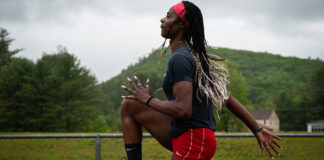
Recently I watched the televised charity match between England and the Rest of the World, featuring celebrities, sports personalities and footballers old and present day.
It was thoroughly entertaining (the Rest of the World won on penalties) and raised an astonishing £16 million ($19 million/€18 million) from viewers for the United Nations Educational, Scientific and Cultural Organisation’s Save the Children fund. But that was not the only astonishing thing about it.
For the very first time the English Football Association sanctioned mixed teams, with women playing alongside men on both teams.
Respective managers Harry Redknapp and Arsène Wenger were allowed to select a number of female footballers or call on as substitutes, and I must say they proved to be as fast and skilful as their male team-mates.
So I wonder…is this the shape of sport to come?
Laugh me out of court if you like, but I have a hunch that by the end of this century mixed sport will be the norm, and not just in football.
The increasingly “woke” world in which we live constantly demands equality of the sexes. Nothing wrong in that, and we see from day to day just how much women have advanced on the playing fields and sporting arenas.
They are physically stronger, fitter and more talented than their predecessors who struggled for recognition and support in what was predominantly a male domain.
I hear, for instance, that Britain’s hardest punching female boxer, world middleweight champion Savannah Marshall, actually knocked out a male sparring partner while preparing for the next bout.
Now women compete in just about every sport in the book, inside the Olympics and out. Just against other women, of course, apart from a few exceptions such as archery, darts and equestrianism.
Yet I really do see future female participation alongside men in most major team games by the year 3,000 – if not before. The charity match, played at the London Stadium, which hosted the Olympic Games of 2012, was an enthralling contest featuring, among other luminaries Usain Bolt, Sir Mo Farah and Ukraine’s football legend Andriy Shevchenko.
International female footballers Chelsea Grimes, Eni Aluko, Anita Asante, Heather O’Reilly and Carli Lloyd all made gender neutral history with their Soccer Aid debuts.

There is no doubt that in the next eight years sport will undergo some seismic changes. We might even see a female President of the International Olympic Committee and many more women heading up sport’s governing bodies. Not a bad thing as at the moment in quite a few sports quite a few chauvinist males seem to be messing things up.
Hopefully by the time the 30th century dawns the troublesome – and troubling – issue that currently dominates the sports agenda might be resolved – that of participation by transgender athletes.
We have reported how the articulate and strong minded former Olympic swimming silver medallist Sharron Davies has given vehement support to the decision by world swimming authority the International Swimming Federation to ban transgender athletes from women’s events.
She is calling all sports to follow suit, but so far only hockey and triathlon have signalled a willingness to do so, the latter today announcing the creation of an “open” category in which male trans gender and non-binary athletes can compete but only against men. Obviously fence sitting is now an Olympic event.
However it seems likely that Nadine Dorries, the United Kingdom’s new secretary of state for culture, media and sport, is of a mind to impose a ban on transgender athletes from elite sports. She says it is a problem with which she has wrestled “long and hard”, adding that it pains her to think she might alienate some athletes.
Maybe there is another solution, one I make with tongue stuck firmly in cheek – not allow free competition for all, male, female, openly gay, secretly straight, or simply trans.
In which case athletics for example could follow the rule they have when a record performance is wind assisted, which is asterisked “wa.” A victory by a trans athlete would be labelled “ta.”
Come to think of it perhaps this is also a way to eradicate the lingering scourge of doping. The letters “da” after the name would tell us all we know.
Finally, as Wimbledon draws to a close it was interesting to hear the original sporting suffragette, Billie Jean King, now 78, saying that she thought the most vexing issue facing tennis is that of possible transgender participation.
“I just feel that everyone who wishes to play tennis should be able to do so,” she says.
King’s one time sparring partner Martina Navratilova has upset the LGBT community by saying that allowing male-to-female transgender athletes would be “insane and cheating.”
Maybe so. I still wouldn’t mind betting that eventually we will witness more matches like that in 1973 when Billie Jean King played a male opponent Bobby Riggs in tennis’s one and only “battle of the sexes” – and beat him! Only this time on Wimbledon’s Centre Court.
Mixed singles, anyone?








